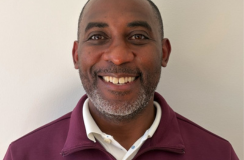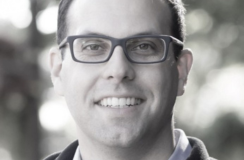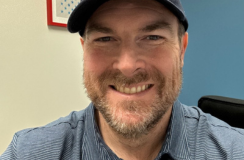ark Litton always wanted to be an entrepreneur, but he never imagined he’d get there by acquiring the family business.
In 1978, Mark’s father founded Howard Medical, a niche medical distribution company in Chicago. The whole family was embedded in the business from the start. Mark repackaged gloves in the company warehouse on weekends and overheard work discussions at the dinner table, and his mom even coded their ERP software in the ‘80s.
Mark studied entrepreneurship in college. He had a chance to try his hand at running a house painting franchise while he was still a student. This experience was instrumental in teaching him what day-to-day business ownership can be like.
Still, he left school thinking he’d eventually be a founder.
Mark joined the Howard Medical team in 2012 as a salesman. Then, in 2015, his dad decided to sell the business and asked if Mark would like to buy it. Focused on his goal of becoming a “real” entrepreneur who founds his own business, Mark refused — but his wheels started turning.
“We don’t talk about the person who took a business from one to 10, or from 10 to 100. It’s a lot lower risk than trying to go from zero to 100.”
After he ran the numbers and did a bit of research, he realized what a smart option acquisition would be compared to trying to build his own business. He changed his mind, and they struck a deal. At the time, Howard Medical’s revenue was in the $1.5M-$2M range, with 10% net margins. They decided on 100% seller financing, which left banks out of the picture and made the whole process straightforward.
Mark had a lot to learn after becoming company president. Initially, he lost a lot of the relationships his dad had built over the years. But after seeking out free resources and specialized business coaching, Mark turned things around.
Howard Medical has been thriving since the start of the COVID-19 pandemic because of Mark’s commitment to upholding the company’s values. In 2020 revenues exploded from $2M to $8M, with margins exceeding their historical 10%.
Check out:
✳️ Top takeaways from the episode
✳️ Episode highlights with timestamps

Acquisition Entrepreneur: Mark Litton
💵 What he acquired: Mark was hesitant when his father asked if he wanted to buy Howard Medical, the Chicago-based medical distribution business that had been in the family since 1978. He got on board with the idea of acquisition, rather than founding a business of his own, after taking a hard look at the numbers. In January 2016, Mark acquired the successful family operation and succeeded his father as its president.
💡 Key quote: “I have a ‘When my back’s against the wall, I’m just going to keep going until it works’ mentality, and I think you have to have that as an entrepreneur. No matter what business you’re in, your back’s going to be against the wall when it comes to it. No business runs smoothly. No business is up-up-up every single month.”
👋 Where to find him: LinkedIn
Acquisition Tips From the Episode
Top takeaways from this conversation
🐝 “Entrepreneur” doesn’t have to mean starting from zero.
Throughout college and his early career days, Mark bought into the idea that being an entrepreneur meant building your own business from scratch. He clung to that as his goal and declined his father’s proposal that he buy the family medical distribution business.
After diving into the numbers, Mark learned the glorified notion of being a business founder is shrouded in myths. Acquisition is almost always the smarter financial choice.
Now, Mark encourages other entrepreneurs to consider acquiring an established business — for both their sake and the sake of the companies that need new leadership.
🏦 Consider 100% seller financing (and sidestep the banks).
To make a familial business acquisition as easy as possible, consider 100% seller financing. Mark’s purchase price was in the high six figures, he paid 0% down, and his dad agreed to a 17-year payout period. Both parties were still required to hire a lawyer and engage in their respective due diligence, but the entire transaction was much easier without the involvement of a bank.
🤝 Hold on tight to the relationships the seller built.
When Mark’s father left the business, some of his longtime customers left too. They didn’t have much confidence in the new ownership and the logistical changes that came with it. Mark learned the hard way how important solid relationships were for the local business’s survival.
Howard Medical pulled through what Mark calls its “dark times” (the period right after he acquired the business) by coming back to its values of transparency, reliability, agility, and compassion.
Especially during the COVID-19 pandemic, he focused heavily on showing up for his loyal customer base and being fully transparent with them about his inventory. As a result, the company 4X’d revenue and doubled its staff in 2020.
⏸️ When your back’s against the wall, hit pause and reach for support.
Mark came into his role as owner and president of Howard Medical having read that 70% of second-generation businesses fail. After a rough first year ending in negative profits, it seemed like he might fall into that unfortunate category of failed family transitions.
Instead, he pulled himself out of a major confidence dip and found the resources to improve his business leadership skills. He discovered the business was making the classic mistake of doing a little bit of everything, rather than focusing on what it did well.
Once Mark invested in his professional development, Howard Medical took a turn for the better and has continued its successful run under his leadership. He recommends that owners of newly acquired businesses take advantage of the wealth of free business training that’s available through organizations like the Small Business Administration (SBA).
Episode Highlights
Inflection points from the show
[2:43] Entrepreneurship in the blood: Mark grew up helping out with the family business and tested out various entrepreneurial undertakings of his own as a child, including door-to-door magazine subscriptions.
[7:21] Striking a deal with Dad: When Mark’s father needed help with sales at Howard Medical, he offered Mark seed money to start his own company if he could successfully grow the family business by a certain amount in two years. Since Mark was itching to get moving on his own entrepreneurial path, he accepted and began working for the company in 2013.
[9:45] Planting the acquisition seed: A couple of years later, Howard Medical was up for sale. But when prospective buyers wanted to dismantle the company, Mark’s dad asked him to buy it instead. Mark declined but the offer lingered in his mind.
[13:41] The myth of acquisition as a cop-out: Working with family wasn’t an issue for Mark, but he had to overcome the belief that buying an established business didn’t count as true entrepreneurship. Once he looked into what acquisition would mean for him and the business, he realized it was a smarter move than trying to start a company from the ground up.
[14:50] Zuckerberg is not the norm: Mark says we have glorified notions of famous founders that have had wild success with businesses they started. We don’t hear about the people who’ve made great strides by taking over an existing business. He encourages listeners to research all forms of entrepreneurship before jumping in.
[16:00] Walk in the door profiting: Why does it make sense to acquire a business? You’ll already have cash flow from day one. Mark says the math is in favor of acquisition and he wishes he would’ve understood that more fully when he was hesitant about buying Howard Medical.
[18:53] Seller financing for a family-based transition: Mark and his dad went with 100% seller financing because they could leave banks out of the equation and establish looser terms. The numbers were in the high six-figure range, with a 17-year repayment period.
[20:23] Due diligence is critical: Mark admits he didn’t have a great handle on the numbers before he became owner and president of Howard Medical, even though he was closely connected to the business.
[25:30] Surviving the supply chain crunch: Howard Medical has done well during the COVID-19 economy because it maintained transparency and local loyalty. The company views itself as partners of Chicago area hospitals and has seen substantial growth with pre-existing accounts.
[29:09] 2020’s impact on the medical industry: Despite the unfortunate circumstances, the medical industry saw massive growth in 2020 — and Howard Medical was no exception. The business was quick to respond and grew from a $2M company to an $8M company.
[31:06] Riding on core values: Rapid growth can be painful for a business, and Mark says Howard Medical survived it by holding tightly to its core values of transparency, reliability, agility, and compassion.
[37:40] Acquisition risks: Even though Howard Medical was well established, Mark still felt some pressure about the acquisition. He had read horror stories about family business transactions blowing apart relationships and felt responsible for keeping his parents comfortably in retirement. Still, he was determined to try anyway and had faith in his family’s resilience.
[41:40] Year one struggles: Things were touch-and-go in Mark’s first year as owner of Howard Medical. The company lost some important relationships because he came on the scene, and that was apparent when he looked at his negative margins at the end of 2016. For a while, his confidence was shot.
[43:47] You can only tread water for so long: Mark knew he needed some help if he was going to succeed in his new role. He took advantage of free opportunities for business coaching through the SBA’s Emerging Leaders Initiative and started working with the experts at Cultivate Advisors. Reaching out when he needed it most took Mark from working in his business to working on it — a tried-and-true concept he says is key.
[49:18] Find your free business blueprint: Mark is passionate about advising other entrepreneurs because he wishes he’d known to have conversations and do more thorough research before buying a business. Only decide to acquire a business if you won’t hate what you’re doing every day, he says. And once you’re in it, have faith that you can push through the dark times.
Links & Mentions
✅ SBA Emerging Leaders Initiative










%20-%20thumbnail.png)






%20-%20thumbnail.png)



%20-%20thumbnail.png)

.png)




%20-%20thumbnail.png)















%20-%20thumbnail.png)































































